Emeli Sande interview: the singer’s search for the nation’s top buskers
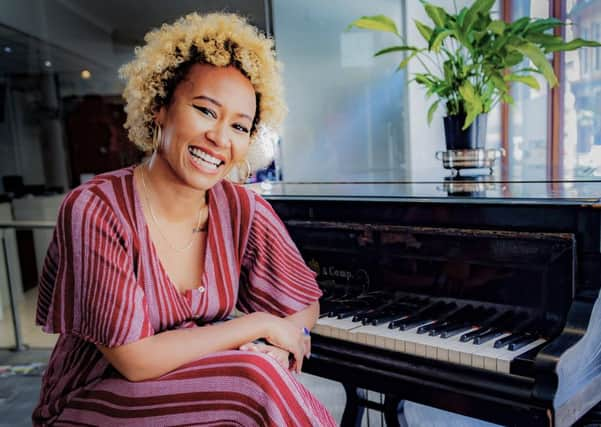

Racing to meet Emeli Sandé at the BBC HQ in Glasgow I pass two buskers on Buchanan Street captivating their audience of passers-by with Folsom Prison Blues on acoustic guitar and cajon. I slow to watch the duo with their tight guitar, great voice and spot on percussion as the crowd nods, claps and rewards the Cash with cash. Sara ‘N’ Junbug, it says on the cardboard sign propped in front of them and as they break into another cracking song I dash off thinking they should be in Emeli Sandé’s new TV show.
As it turns out, they are. Starting this week, Emeli Sandé’s Street Symphony sees four hour-long episodes which follow the singer as she travels the length and breadth of Scotland watching buskers, from traditional to techno, playing bagpipes to blues, to pluck her six favourites from the streets to join her for a live concert with the BBC Scottish Symphony Orchestra at the City Halls in Glasgow.
Advertisement
Hide AdWhether Sara ‘N’ Junbug make the final cut to join more than 80 musicians on stage at once, we don’t know yet, but they turn up in episode one among the pop, soul, classical, country, funk and rock performers Sandé meets on her hunt. Her verdict:
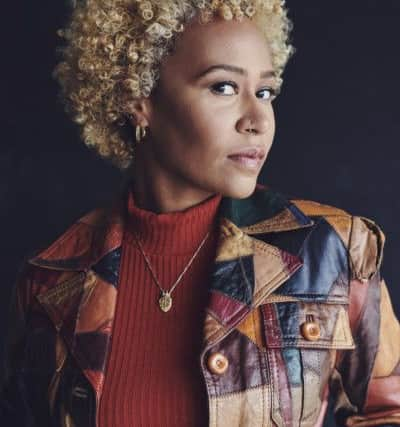

“Amazing. I was blown away by them. I love the cajon and the precision of the lyric and playing. It’s like a bolt of electricity.”
For Sandé the journey was a chance to check out street performers playing come rain or shine, driven by a passion to perform and share their music.
“I knew that Scotland had a lot of talent and it’s a music-loving country but to see it in person and see how much is out there is really exciting,” she says.
Making the programme was also an opportunity to revisit her Scottish roots and re-trace her musical journey from Aberdeenshire to Glasgow then London, from singing schoolgirl to successful solo artist with four BRITs, three MOBO Awards, an MBE, and this week, a third album, Real Life. She’s also celebrating being appointed chancellor of Sunderland University, where her parents met as students, one of her first tasks being to finally award them their degrees – “They were in Zambia at the time after having me,” she says. Plus she’s working on a musical, based on An American Tragedy, Theodore Dreiser’s 1925 novel, of which she says: “I’m realising it takes a lot longer than an album, so we’ll see how that goes.”
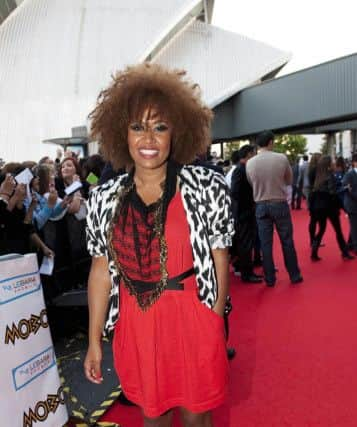

As she travels from Aberdeen to Perth to Dundee, Edinburgh then Glasgow, Sandé recalls growing up in Alford, arriving in Glasgow, for her “Scotland’s singing heart”, to study medicine at Glasgow University, and the launch of her musical career. It was a chance encounter in 2009 with Beyoncé producer Naughty Boy that led to her singing guest vocals on Chipmunk’s Diamond Rings, then she landed a deal with Virgin which led to a hit first album, Our Version of Events. Along the way there were collaborations with Naughty Boy, Labrinth and Professor Green, and songwriting for urban acts Wiley, Wretch 32 and Chip, and the likes of Alicia Keys and Rihanna.
Advertisement
Hide AdIn person Sandé comes across as laid-back and at ease in her own skin, the platinum quiff now relaxed into a blonde afro. Accustomed to playing live to crowds of thousands in theatres and at festivals, singing for the likes of Obama in the White House, when it comes to busking, she admits she’s out of her comfort zone.
“I didn’t have the guts to get out there and busk when I was up and coming,” she says. “I have nothing but admiration for them. It takes a lot of bravery to put your face and your music out there, with no guarantee of making money. And for the best spots they have to get there early. There’s a lot of work goes into a genuine desire to perform.”
Advertisement
Hide AdBut after joining in with some of the buskers on the street, Sandé is up for giving it a try: “I would do it now after doing the show,” she says. “Especially with the album coming out. This album’s all about real life and stripping everything back and maybe this is time for me to busk, see how it goes, with just one instrument and one mic. It would be pretty nerve wracking for sure. I would love to play the piano, but that’s a bit impractical. So it might be time to learn the guitar.”
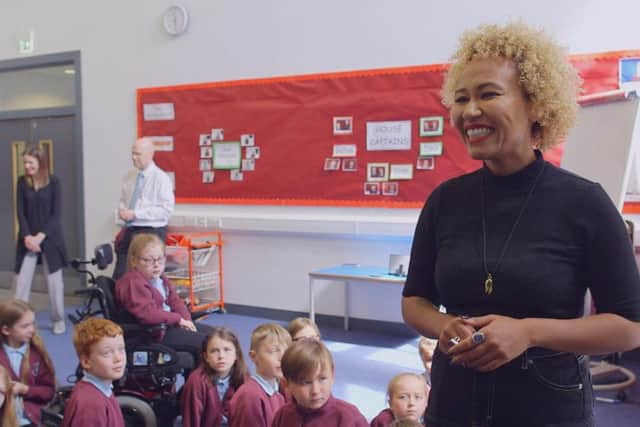

Which song would she serenade the shoppers with?
“Oh. Ummmm. I mean… I could attempt something like Whitney Houston... but that would be quite dangerous. Actually I’m gonna take that back. That would be too hard.”
Aw go on, maybe I Will Always Love You?
“Oh imagine…” she looks apprehensive, yet tempted.
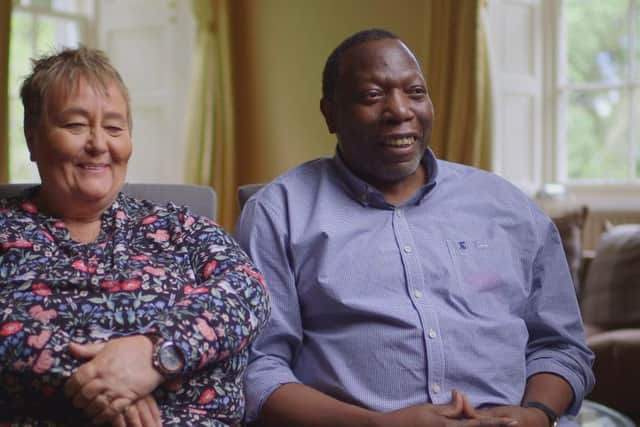

“I Will Always Love You… or My Love Is Your Love, that’s one of my favourite songs. But you’d have to give it… the more that people know the song the more you have to just go for it,” she says.
Or she could do one of her own songs?
“Yeah, maybe Read All About It,” at which point she remembers that she did sing this on Argyle Street in Glasgow with busker Ben Monteith during filming, “yeah, that was fun,” she says.
With so much talent on the street Sandé struggled to whittle the performers down to just five and in the end went with six to perform in the live show with a full orchestra conducted by John Logan.
“I based it on a gut instinct, an emotional reaction really. Who would I want to see on stage with an orchestra and who really pulls me in emotionally. Is there something different about how they’re conveying the lyric, which voice stands out as unique? And also I wanted there to be a great variety of different styles – classical music, traditional Scottish...”
Advertisement
Hide AdThe six chosen receive voice tuition and have their compositions orchestrated by Logan, then perform a song of their own and a duet with Sandé in the concert at Glasgow’s City Halls with the full BBC Scottish Symphony Orchestra.
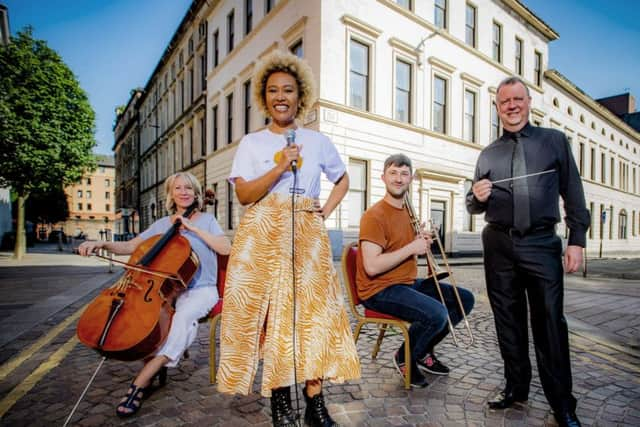

For Sandé making the programme was an emotional and inspirational experience, not just because of the sheer talent on display, but also because of the ambitions expressed by the buskers.
Advertisement
Hide Ad“I’d ask them what do you want to do with music, what do you want to do with this show, what are your ambitions? And I expected everyone to say I want to get signed, but they genuinely just wanted to perform. Their biggest dream is to go on tour, share music with people and make enough money to continue touring.
And I thought ‘wow, that’s it! That’s why everybody gets into music.’ It’s that passion of connecting to people.”
“It brought everything down to reality, and was a big reminder for me as to the real reason I got into music. They reminded me of when I was starting out and I think that was the biggest lesson… Get rid of the industry, get rid of everything that comes with it and what are you left with? That emotional connection to music and the desire to connect with others through it.”
Her new album, Real Life, which she’s about to tour with 24 dates including two in Scotland in November, was made before her involvement with busking yet still has more of a live performance feel than the previous two.
“It was very important that I would be able to perform these songs live as people hear them,” she says, “whereas on the past two albums there were a lot of digital sounds and things that can only really be done on a computer. This time I just feel… if someone says sing Survivor for example, me and the band have the freedom to really give it to them.
“It’s the first album where it’s only been live instrumentation, which has always been a dream of mine. Troy [Miller, the producer] asked what album do you wanna make – no-one had ever asked me that – and I said I loved Bob Marley, Aretha Franklin when I was growing up, so we listened to loads of music and he said, you realise all of these people, that’s live. So we made that decision to do it and keep it analogue.”
Advertisement
Hide AdIt’s been four years since her last album, in which she expressed the highs and the lows of her life so far, growing up mixed race in Alford feeling ‘other’, the stratospheric success of her career and the end of her ten-year relationship with Adam Gouraguine, the marine biologist she started dating at 17 and married in 2012, as well as the strengthening of family bonds and identity through a visit to her family in Zambia. After touring that album, she took time out before working on a new one.
“I really tried to take the time to just personally get in a centred place, and to ask myself as many questions as possible. You know, why do you want to make music? What is it there for? I was trying to align myself in a place that made sense for me as an adult. ‘Cos I’d gone from uni straight into the music industry and done an album... and that album’s success was amazing and I feel so grateful for it... but at the same time you kind of have to catch up with yourself – what are your other hobbies outside music? How’s your family doing?”
Advertisement
Hide AdAs well as the metaphysical, there were more corporeal concerns, such as building a home studio, and the addition of another tattoo to the inkings that trace significant life events on her body. Alongside the words “Un Cuarto Propio”, a Spanish translation of “A Room of One’s Own,” the title of Virginia Woolf’s essay which Sandé had to celebrate her acquisition of “a room with no windows and a piano in Bethnal Green, a place where I could create and felt freer than I’d ever felt in my life”, there’s a self-portrait of Frida Kahlo, “after I made the plunge into being an artist”, and a dove above the legend “It seems that dreams are all we’ve got left”. Now there’s an eagle from the Zambian flag and the initials NGOSA on her fingers.
“I always wanted a traditional Zambian name so about four years ago I asked my grandmother (also Emeli) to bless me and she said I would be Ngosa. So I thought I just want to mark this. Going to Zambia was a big breakthrough for me identity-wise. It was beautiful to see the country and see my grandma and my aunties, the hierarchy within the village between women and the strength of the women and the responsibilities they had. The way in which they did it was with so much spirituality and emotion, it just really grounded me and showed what strength can look like in other guises.”
Were the women in charge then?
“They seemed to be, for sure, running everything and definitely put the men to good use, like one guy was doing the mill and the tractors and there seemed to be equality but my grandma was for sure in charge,” she says and laughs.
Now 31, Sandé feels she’s also coming into her power as a woman herself, the shy teenager long left behind.
“People say as you get older you get more confident, these are the best years of your life and until you experience it you’re not sure what they’re talking about, but now I can feel it. I just feel I care less. I care what the people who love me think of me but I don’t care as much what other people think. Every day I just feel like I’m growing in understanding and confidence and also what it truly means to be a woman, not what society tells us, delving deeper into other cultures like in Zambia, and looking further into the past and beginning to kind of build my own picture of what it means to be a woman or what it means to be feminine. All of these things are making a lot more sense to me now.”
Along the way on this journey of self-doubt and self-discovery, Sandé learnt a lot about survival and working through struggle.
Advertisement
Hide Ad“The separation, the divorce, that was very difficult. When my world as I knew it fell apart, that was like… oh, wow, what am I gonna do? Rebuilding from that is something I’m proud of myself for doing… and also having to do it publicly was difficult. So if I can get through that then there’s lots I can do and push myself through.
“Also growing up feeling quite different and quite alone, it’s not an easy thing for someone so young, so I think that was survival. And now I just think, like, bring it on. Let’s see what’s next.”
Advertisement
Hide AdSandé puts a lot of herself into her music, the lyrics simultaneously universal and deeply personal and since she’s open and frank in conversation, it doesn’t feel too intrusive to ask if she’s in a relationship at the moment.
“No, but I think I’m ready for that stage in my life so I’m just… it’s interesting exploring the male side of the world, you know. It’s a whole other story, so I’m enjoying it,” she says and laughs.
So she’s dating?
“Yes.”
Just going out and having fun?
“Exactly.”
In her album and BBC Scotland show Sande’s all about giving people hope and confidence, something she thinks we need more than ever.
“I made a conscious effort to try and give what I’ve learnt and the way I feel now, to try and bottle that for anybody out there that may be struggling through something. I want these songs to really sing for them.
Because it feels like there’s an illusion of confidence, with social media – everyone seemingly living the best lives they’ve ever lived, but we’re not able to talk about what’s really going on behind the filters and the screens. More and more I’m hearing about people suffering from anxiety and depression and suicide rates are increasing, and I think what is going on?
“So I want to be as open as I can be about what I’ve been through because there is no shame in talking about struggle and difficulties and getting over the other side. I feel lucky I’ve had music in my life as a therapy. Even from when I was a kid, music was always there giving me strength and making me feel like I had something to lean on. I wanted to give that back and make music that can give people strength.
Advertisement
Hide Ad“It feels like a superpower, and I want to use it wisely, share it, give people hope and light that, yes, it’s difficult now, but you can be a survivor and shine.”
Emeli Sandé’s Street Symphony starts on BBC Scotland on Thursday 19 September at 10pm. Her new album Real Life is out now and she performs on 17 November at Edinburgh’s Usher Hall and at the SEC Armadillo in Glasgow on 19 November, see www.emelisande.com for more details.